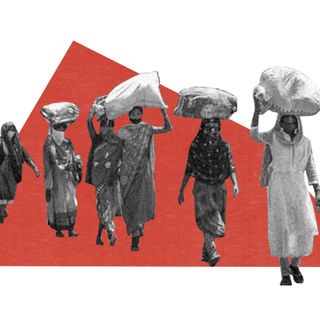
Indian NGOs Are Unable to Access Millions in Covid19 Foreign Aid Due to Govt Regulations
NGOs face overwhelming paperwork and long waiting time under the amended Indian regulations governing foreign aid.

Individuals and civil society groups across the pond are rallying to help India respond to the catastrophic Covid19 crisis. Donations — through fundraisers, bake sales, awareness campaigns — directed to the health system or individual charities, however, are struggling to maneuver India’s foreign aid regulatory laws.
Foreign aid has become an important avenue for helping Indians navigate tough waters. To receive help from foreign donors, Indian NGOs are required to submit a volley of paperwork — some are hard-pressed to meet the demands during the pandemic, others say they don’t fulfill the eligibility criteria, such as having an Aadhaar card. To send help, foreign organizations are trying to find ways to navigate the red tape. The result is an aid channel, which has senders and receivers eagerly placed at each end, but is currently obstructed.
At the heart of the bureaucratic hindrance is a legal provision called the Foreign Contribution (Regulation) Act, 2010 (FCRA), which regulates the functioning of NGOs. NGOs are eligible for receiving foreign aid for social, educational, religious, economic, and cultural reasons — and registration is mandatory for any contribution.
During the pandemic, in September last year, the central government amended the FCRA, making the regulations more stifling. “A sweeping change to India’s decades-old law governing foreign donations is choking off foreign aid just when the country needs it desperately,” the New York Times explains, noting how the amendment limits international charities’ bandwidth to donate to local NGOs.
Related on The Swaddle:
Indians Living Abroad Are Feeling Grief, Despair. Many Are Using The Internet to Help.
For one, as of April 1 this year, all NGOs registered under the FCRA are required to open an FCRA-designated bank account with the State Bank of India — and specifically under the New Delhi Main Branch. Currently, only 16% of registered Indian NGOs have an account with SBI’s Delhi branch. Some NGOs say despite submitting all documents, their accounts hadn’t opened yet. Moreover, those who did manage to open a bank account are not authorized to operate this until the Ministry of Home Affairs gives its official nod to let these accounts function, making the possibility of procuring foreign aid impossible in the immediate reality. To further complicate matters, the chief functionaries, trustees, and office bearers are all required to compulsorily register their Aadhaar details. Other legal changes include restrictions on transferring money from larger NGOs (who are touchpoints for foreign aid) to smaller ones, which, particularly during the pandemic, are coordinating relief efforts on the ground.
The amendments were introduced as a means to increase accountability and strengthen compliance within the non-profit system. However, the timing of the amendment colludes with the red tape, translating into a systemic handicap for both those who want to help and those who need help. The key changes to the FCRA in recent months “have ensured very few NGOs can directly accept cash donations from abroad at a time when even the central government has been forced to look outside the country for critical supplies,” Ashutosh Sharma writes in LiveMint.
Recently, organizations from Andhra Pradesh and Assam moved the Delhi High Court and Guwahati High Court last month, seeking exemption from the guideline requiring them to open an SBI account until March 31 to enable them to keep their FCRA licenses.
The government continues to exhibit a lack of institutional foresight and unwillingness to be flexible, even as NGOs plead for it to grant some relaxation in the present circumstances — when a resource crunch is costing lives.
The importance of mutual aid during the pandemic cannot be overstated: international donations have helped raise millions. The American India Foundation on Thursday raised $25 million for oxygen supply, PPE kits, ventilators, other resources. Hollywood celebrities are sharing online fundraisers. MNCs are pledging millions. Now, NGOs say they are turning away donors because of the inability to redirect them or the long waiting time. The AIF wired $3 million to its affiliate on the ground last week, but the money still hasn’t cleared, the New York Times reported.
The result is a “funding squeeze,” as Sharma puts it. “In an average pre-pandemic year, Indian NGOs used to receive about Rs. 16,800 crore in foreign donations, accounting for roughly a fourth of the overall philanthropic spending in India. A sizeable chunk of this money has now been taken out of the system, particularly at a time when it is perhaps most needed.” A group of 13 NGOs sent a letter to Indian and U.S. authorities, noting that the various regulations have “paralyzed” India’s nonprofit sector.
These recent legal and regulatory changes echo an inflexibility, preventing many civil society groups from supporting a country and its people in crisis. “Every possible source of help is needed; every individual, every organization, every government agency is needed,” Amitabh Behar, Oxfam India’s head, tells LiveMint. “We are losing lives every day, every minute.”
Saumya Kalia is an Associate Editor at The Swaddle. Her journalism and writing explore issues of social justice, digital sub-cultures, media ecosystem, literature, and memory as they cut across socio-cultural periods. You can reach her at @Saumya_Kalia.
Related


Give Wages, Arrange Trains for Migrant Workers Impacted by Covid19 Curfews: Academics
